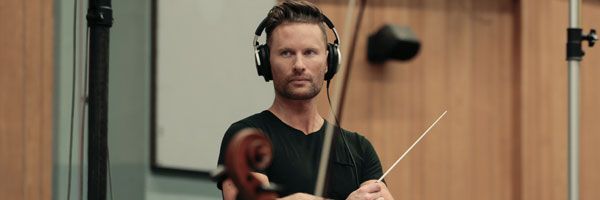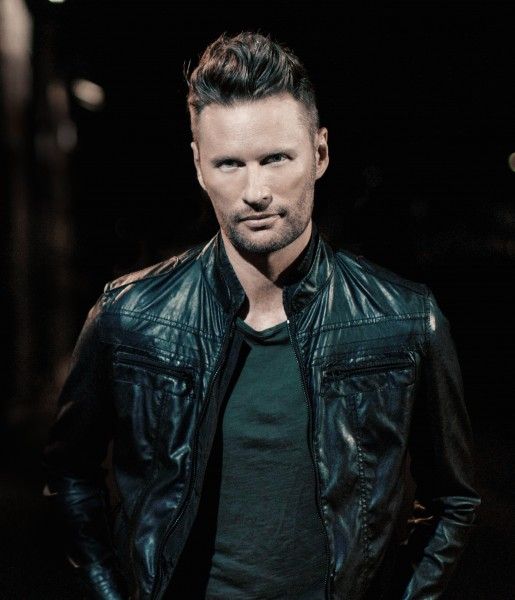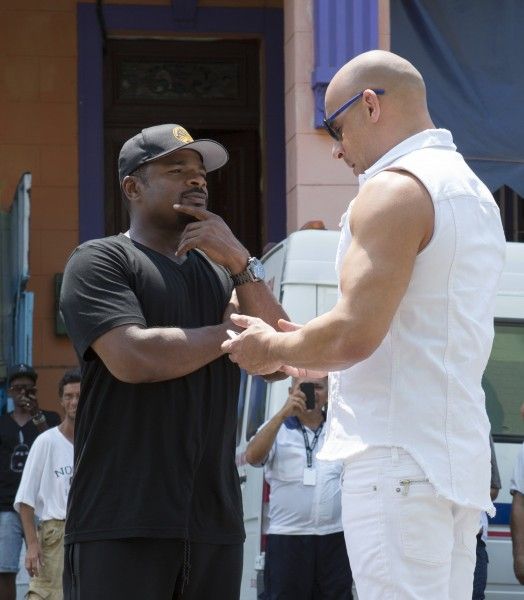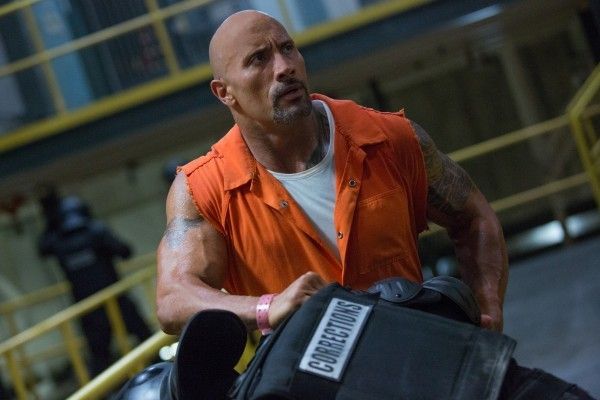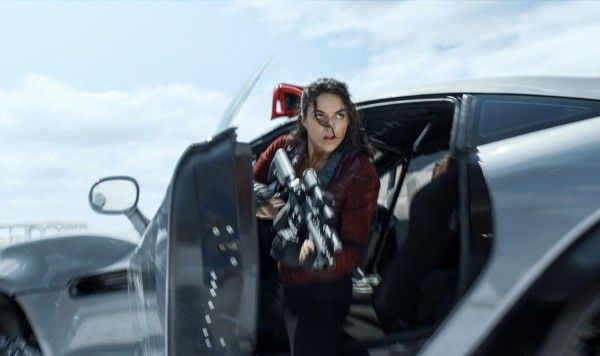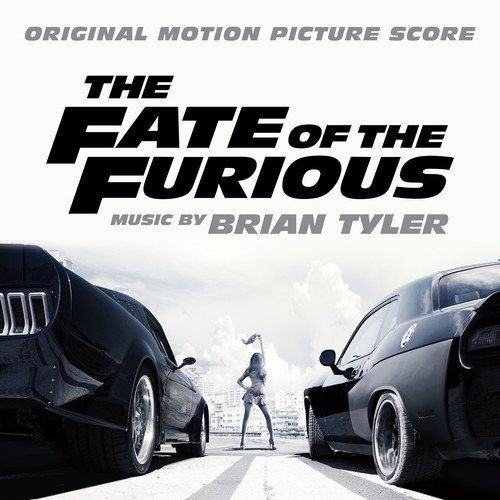When it comes to film composers, not many have had as deep and as diverse an experience working on major blockbuster films as Brian Tyler. The composer whose early work includes the memorable Bill Paxton film Frailty as well as Bubba Ho-Tep now regularly lends his talents to some of Hollywood’s biggest films ranging from Avengers: Age of Ultron to Power Rangers to The Expendables franchise. Tyler’s also no stranger to more dramatic films like Truth and also lends his talents to the small screen on TV series like Scorpion and Hawaii Five-0, but he is perhaps most memorable as the primary composer for the Fast & Furious franchise.
As you’ll read in my interview with Tyler below, his roots with the Fast & Furious franchise date all the way back to the first film The Fast and the Furious, but he’s scored almost every movie in the series since The Fast and the Furious: Tokyo Drift. This gives Tyler unique insight into the evolution of the series from a small scale action-thriller to a global phenomenon, and his job from film to film has changed accordingly.
With The Fate of the Furious recently scoring the biggest worldwide opening weekend of all time, I recently got the chance to speak with Tyler about his work on the eighth film in the franchise and his collaboration with F. Gary Gray. Over the course of the conversation we also discussed his history with the series and the evolution of his scores, as well as surprising touchstones for Fate like The Godfather Part II. Additionally, we talked about his terrific work with Shane Black on Iron Man 3, collaborating with Danny Elfman on Age of Ultron, working with Marvel, and his upcoming score for The Mummy.
This was a fun and illuminating conversation for a film music nerd like myself, and Tyler’s got some great insight into the experience of scoring some of the biggest films around right now. Check out the interview below and click here to pre-order Tyler’s score for The Fate of the Furious, which will be released on Back Lot Music on April 28th.
Collider: What were your initial conversations with F. Gary Gray about this film like? Was there a central theme or idea did you hit upon?
BRIAN TYLER: There was. I mean the initial conversation I had with Gary was basically when he first was brought onboard to take over and direct this film. It was a unique situation where I had previously done a film with Gary, I did Law Abiding Citizen with him and I’ve known him for years, and then I’d also been doing the Fast & Furious movies for years so it was like we were joining forces or something (laughs). I was really happy that he took the movie and that they offered it to him and all that, I thought he was the right person for it. So we started talking about the vibe of how we wanted to present this film as having its own unique flavor in the series. I read the script and so I really started thinking about ideas before they filmed, and the central themes that were gonna be added to the pot here was that not only was this movie exciting and it’s about family and relationships and the drama, but we have kind of a new twist which is this betrayal, and that connecting to this new kind of ultimate baddie and the villain with the character of Cipher, played by Charlize Theron. There are some things that happen in it that kind of go to a dark place, so the idea of the Godfather of the family kind of changing. The music needed to have this kind of vengeance factor and this betrayal factor and really the movie that we talked about mostly, Gary and I when thinking about this in terms of tone, was the Godfather movies and Godfather Part II specifically. While at first blush you might not really think of Fast & Furious and Godfather as similar vibes (laughs), we needed to inject some of that feel into this particular story. So musically you can see how it takes that turn a little bit more than we ever have before.
Once you started actually scoring it, was there one big challenge that you remember encountering?
TYLER: Yeah I mean the challenge for me was the fact that you need to score the drama of what’s going on and the betrayal and all these kind of darker moments with the fact that it’s still ultimately a really entertaining fun movie with Ludacris and Tyrese doing their thing and Dwayne and Jason, and I think that was there to kind of balance the weight that is in the rest of the story. So writing that music and being able to kind of weave a tapestry that all fit together was certainly one of the big challenges, and I’ve found that it really required having certain scenes that could be played a little bit more positively or a little bit darker and more negative. And that’s always a tough one if you come up with a melody that can go in both directions, it can be uplifting or darker and it’s a bit of a trick. So that was certainly a challenge.
Was there any kind of new instrumentation you brought to this film compared to the rest of the franchise?
TYLER: Yeah, I think it’s almost like a band getting back together. I feel like I’m in this band called “Fast and Furious” and this is my fifth or six time doing these, and when a band gets back together—you hear a Radiohead record you recognize as Radiohead but it’s like “Okay that’s them, I recognize Thom Yorke singing, I can feel the vibes, but it’s a different thing than the last one,” and that’s kind of how I wanted to approach all of these movies; they all have their identity, but they’re connected. So the themes remain connected—you have Letty and you have Dom and of course Brian and Mia’s theme that has kind of filtered into the family vibe, you have the team theme, Roman has a theme, all these things are kind of connected, but at the same time it’s not so much of like introducing one new instrument or something like that. It’s more introducing a new soundscape based on the written notes, so it’s really melodically where it changes. And the band aspect is like you kind of use a similar band, which is orchestra, drums, programming—which of course evolves over time because that part of it, the programming and the synths and stuff like that, those elements of course change with the times. You’re influenced by contemporary music, so whatever is going on, Fast and Furious does reflect what’s going on in the world of everything from underground to pop music while still maintaining this largesse of orchestral music. So I was just focusing more on the writing and then it kind of just comes natural when I’m producing the tracks, the modern elements I kind of just go into producer mode like when I work on records that have nothing to do with a movie, and I guess just naturally it kind of updates itself in the back of my mind (laughs). I’m not sure how it works.
Well you have been working on this franchise for so long, and I’m curious how has your job as a composer evolved as the series itself as evolved alongside the franchise as it started as kind of this rock, hip-hop-y thing and now it’s this massive blockbuster thing?
TYLER: It’s even kind of weirder than that, or cooler in a sense that my roots to Fast and Furious go back to the first movie because I had music that was licensed into that movie and it was actually score. I had music from an indie movie I did called The Fourth Floor, and that music was licensed for the climax section of the movie, which of course became sort of confusing for people because they’d see that I do the Fast and Furious movies, my name’s Brian Tyler, and BT scored the first Fast and Furious and we have the same initials, and also I did happen to have music in the movie so if you look at the end titles my name’s in there, so people just figured I was him and he was me—we still get each other’s emails. But really when I started writing scenes for it was on Tokyo Drift. In Tokyo Drift you can see the evolution of the music, even going back to 2 Fast 2 Furious and obviously the first one, because the movies were primarily songs. The soundtrack of the movies were primarily songs, just a little bit of score, not that much. And by the time you get to Tokyo Drift it increased, but it was still not much—I think I did like 45 minutes of music. And each consecutive movie after that, now I record like 108 minutes or 110, and they just got more and more because the storylines became more dramatic and more intertwined and moved away from being kind of a music video-style movie to more like a Bond vibe, in terms of it being its own franchise. It’s such a remarkable thing to watch something evolve like the Fast and Furious series. I don’t think there’s been anything that’s evolved like that, where its roots are so different from where it ended up it’s insane. Usually Harry Potter starts as Harry Potter and it kind of evolves and the characters get older. This is like if Harry Potter turned into like Star Wars or something. Just like evolution you’re naturally selected out—you look at ring species on an island you see one species and you go all the way around to the other side over the years and you go, “Whoa these can’t interbreed anymore because they’re so different,” but each step along the way they can interbreed and they’re kind of connected. I think all these movies are connected when you watch them one by one, but then by the time you get to 7 and 8 you’re in a whole different place. So for the score to be more and more a part of the franchise, the songs are always important in these movies but they become vitally important in picking the song for each spot because there aren’t as many spots anymore. Now it’s become so dramatic and so much of this thriller, action, cinematic sort of feel, of course you need score through the majority of the film. So my job has just gotten sort of more and more. Each one we keep on thinking, “Welp, even more score than the last one!”, and now it’s like pretty much 95% of the movie is score.
Yeah, well not only did it evolve into more of a Mission: Impossible sort of feel, but the last movie made over $1.5 billion. These are no longer little street racing action thrillers, they’re global phenomenons.
TYLER: Yeah the stakes are no longer racing for pink slips. The racing and the car aspect is always gonna be a part of it, but it is a part of it, it has these epic storylines of espionage and global threats. It’s become really intense, so accordingly I’ve found myself using some choir in the last two movies. Who would’ve guessed there would be choir in a Fast and Furious movie? And also sometimes it’s interesting to hear where my music from Fast and Furious is temped. Something you would never expect, if you heard it out of context and you asked “What is this?”, the last thing they would say for some of the cues is Fast and Furious, especially some of the really heartfelt melancholy cues—there’s like an adagio in one of them and there’s like I said a choral an orchestral piece in one of them. Funny enough, I was working on one of the Marvel movies and I heard it in the temp. And conversely I had something I did for Avengers or Iron Man temped into Fast 8, and the fact that you can have that kind of common language between movies that would seem on the surface to be in such different worlds shows you just how far the series has come.
Well speaking of Marvel, you composed one of my favorite superhero movie scores which is Iron Man 3. I love the movie as a whole so much. What do you remember about working with Shane Black on that film?
TYLER: I love that movie too. Shane’s awesome. I love that Marvel takes risks and in a sense he’s such an individualistic kind of director that he has his own vibe, you know? It was such a great movie, and kind of like what I see them doing with Guardians too where it’s like, “You know what? We’re gonna go for it. This guy’s great, he’s done some great work, he’s got a knack for dialogue,” and those things instead of looking at it like, “Has he directed a movie with giant robots taking over a planet?” No, they were looking at dialogue and character development. And the guy’s so knowledgeable with film scores, just as Kevin Feige is. One of my fondest memories is the three of us sitting together at lunch over at Marvel and singing music and having them guess what score it was. Shane and Kevin were nailing things like the march from The Black Hole by John Barry. It’s just crazy. So from many perspectives it was great working with Shane, as it was everyone over there.
You’ve scored a lot of Marvel movies, and Marvel itself has this reputation of like a well-oiled machine or factory. What’s the quote-unquote Marvel experience like, or is it just like scoring any other movie?
TYLER: It’s always awesome working on those films because there’s a unity to it and it’s thematic and you get to kind of find that classic score lane, and Kevin’s all about that for sure.
You also did Age of Ultron. What was it like working with Danny Elfman on that film?
TYLER: Oh man, Danny is one of my heroes. It’s a trip. The first time I heard Danny was, I mean Oingo Boingo, but the first time I heard something he scored was I guess the same for everybody, Pee-wee. It’s so awesome, and so through the years he’s written some of my very favorite scores. It was cool, I wish I could’ve worked with him longer. There wasn’t a ton of time—there were new sections of the movie and all sorts of things, so it was cool ot be able to kind of have all the stuff bridge together and do something that I don’t normally do, which is collaborate with someone. And if you collaborate with someone, if it could be Danny Elfman or John Williams or Hans or James Horner when he was around, that’s what I grew up on. So yeah, it was very cool.
I’m really excited for The Mummy and I was curious what it was like scoring something more in the horror-action lane.
TYLER: Amazing. I mean, I’m so excited about that one. It’s combining adventure and horror and so much that it’s like—I’ve never worked on anything like it. What Alex [Kurtzman] is going for in that movie is incredible. I can’t wait for people to see the movie and hear the score. I was just conducting this week, I was recording a few days ago. You should hear the wonderful London Philharmonia playing in that score, for me it’s a highlight.
Was there kind of a touchstone for you on that score? Did you try to harken back to the original Universal Monsters films or is it more contemporary?
TYLER: It’s classic. The vibe is orchestral. We recorded choir and we recorded orchestra and we recorded some really interesting instruments as well that are really kind of out of the box. It definitely, to me, kind of has all the best elements of a classic movie and I think it needs a classic kind of style score.

